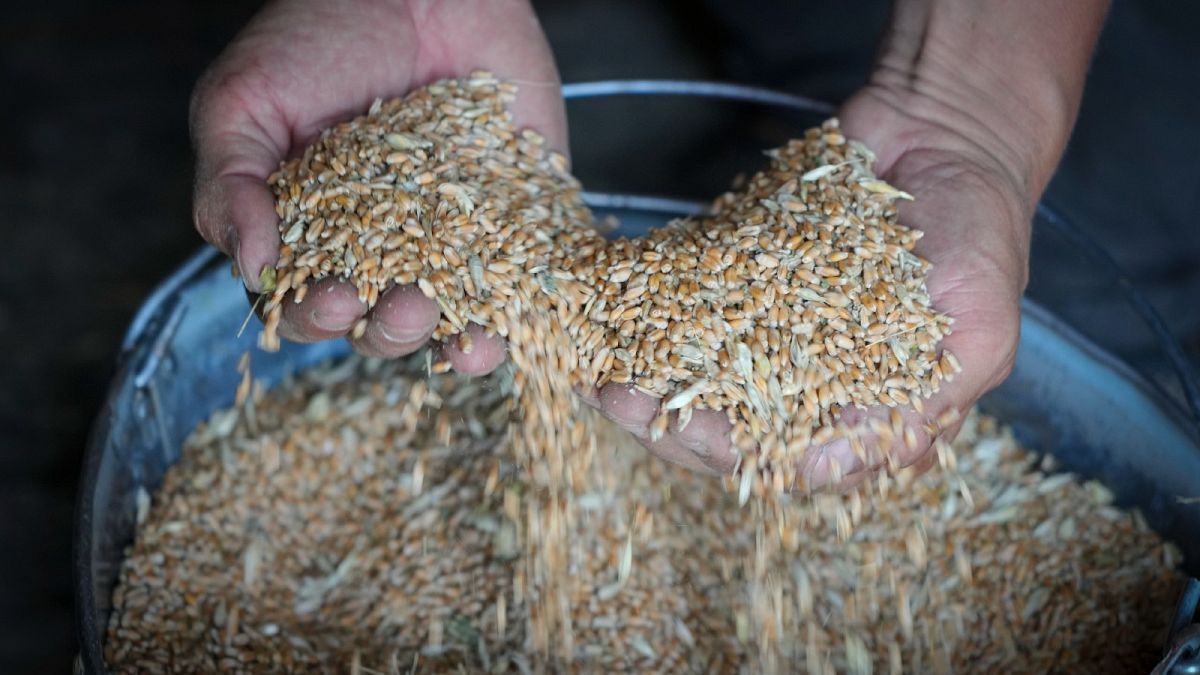Farmers in Ukrainian front-line regions are scrambling to survive a harvest under Russian fire, with shelling feeding fear across a sector already hamstrung by Russia's blockade of the Black Sea.
Farmers in Ukrainian front-line regions are scrambling to survive a harvest under Russian fire.
"Agriculture is one of the few business sectors that is working... of course, they want to destroy it," said Volodymyr Onyschuk, standing near a pile of Russian shell casings on his 2,000-hectare wheat and sunflower farm near Mykolaiv.
Crops will be vulnerable to fire caused by shelling, he said, and that could be “hell” for farmers when the harvest season begins in the coming weeks.
Since Russia's invasion of Ukraine, the world's fourth largest grains exporter, Kyiv has repeatedly accused Russia of attacking infrastructure and agriculture to provoke a global food crisis and pressure the West.
Moscow, which calls its war a special military operation, blames Western sanctions and sea mines laid by Ukraine for the drop in food exports and rising global prices.
Shelling is feeding fear across a sector already hamstrung by Russia's blockade of the Black Sea, the primary route for Ukraine's vast agricultural exports.
Five shells hit a cluster of warehouses and grain conveyer belts at the Nika-Tera plant on 4 June, rendering one of Ukraine's largest agricultural terminals unable to load or unload ships, local officials said.
The blasts also triggered an intense fire in sunflower meal stores.
"They are trying to undermine food security worldwide," said Georgy Reshetilov, First Deputy Head of the Mykolaiv military regional administration.
Huge loses
The region's agricultural facilities have suffered an estimated 34 billion hryvnia (€1.11 billion) worth of losses, Reshetilov said. Sites hit include a large producer of tomato pulp and a large number of farms.
At the same time, combine harvester operators are leery of bringing their equipment to the region, fearing shelling and possible mines and munitions in the fields, according to farmers.
Some grain traders are reluctant to even buy stocks from farmers, fearing they will bear responsibility if their storage facilities are subsequently attacked.
"Nobody can guarantee the safety of this harvest in a time of war," said Reshetilov.
Supplies of fertiliser are also running low, and without buyers for grain exports, farmers said they could struggle to raise funds to buy more supplies, even if they were available.
"Fuel has gone up. Fertiliser prices are insane. I don’t know how we are going to work next year," said Valentyn Matviyenko, who runs a farm near Bashtanka, around 60 kilometres northeast of Mykolaiv, where land is within range of Russian artillery.
Some traders are offering wheat prices that were one-third of pre-war highs, he said. "Our financial resources are dwindling. We’ve put everything into this harvest," he added.
Sea blockade
Few in the region hold out hope that diplomatic efforts will unblock the Black Sea. They said a few convoys of ships would not even dent the volumes that need to be exported, and it is not economical to send the same grain by road.
Additional grain storage in and around Mykolaiv has been ruled out due to the risk of shelling, Mayor Oleksandr Senkevych told Reuters. Instead, the focus is on building facilities closer to the Romanian border where river transport is an option.
The regional administration said it is looking at municipal and communal rather than private storage. The national government, meanwhile, is seeking to simplify export procedures and is offering farmers interest-free loans.
Some are sceptical of state intervention: "The best help of the government is not to do anything .. business will find a way to export the grain," Mayor Senkevych said.
Tractor driver Vasyl Boyko, 38, said he does not believe a solution will be found unless Ukraine pushes back Russian forces and the West opens trade corridors in the Black Sea. "We don't need words, we need weapons," he said.
